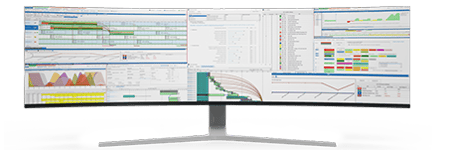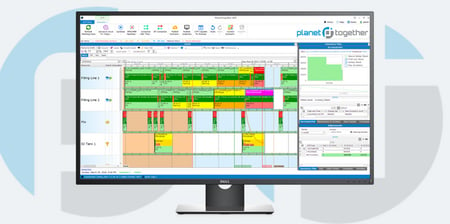Lean Manufacturing: Improving the Production Process in Medical Manufacturing
As an Operations Director in a medical manufacturing facility, you're constantly striving to improve efficiency, reduce waste, and maintain the highest standards of quality. Lean manufacturing principles can be instrumental in achieving these goals, especially in an industry like medical manufacturing, where precision, compliance, and safety are vital.
However, to fully leverage lean manufacturing, integrating it with advanced production planning and enterprise resource planning (ERP) systems like PlanetTogether and SAP, Oracle, Microsoft, Kinaxis, or Aveva can elevate your operations further.
In this blog, we’ll explore how lean manufacturing principles can be applied to the medical manufacturing environment and the advantages of integrating lean methodologies with sophisticated software solutions. This integration can enhance visibility, streamline workflows, and support real-time decision-making, all critical for maintaining a competitive edge in a highly regulated industry.

Lean Manufacturing in Medical Manufacturing
Lean manufacturing is a methodology focused on maximizing productivity while minimizing waste within a manufacturing system. Originating from Toyota’s production system, lean manufacturing emphasizes continuous improvement, defect reduction, and value-driven processes. In the medical manufacturing sector, lean manufacturing can:
Improve production efficiency by eliminating bottlenecks and redundant steps.
Enhance product quality through consistent improvements and rigorous standards.
Reduce costs by minimizing waste, rework, and unnecessary inventory.
Support compliance by establishing reliable, traceable processes.
By eliminating "non-value-added" activities, lean manufacturing helps you concentrate on what's important to customers and regulatory bodies, ensuring each step in the production process adds value to the final product.

Key Lean Manufacturing Principles and Their Application in Medical Manufacturing
Several core lean principles are particularly beneficial in medical manufacturing:
Value Stream Mapping (VSM)
Value Stream Mapping is a lean technique that involves mapping out the production process to identify and eliminate inefficiencies. By documenting each step, from raw material to finished product, Operations Directors can spot bottlenecks, excess inventory, and other forms of waste.
Application: In a medical manufacturing facility, VSM helps ensure that critical steps like sterilization, quality control, and packaging are streamlined, minimizing delays. By integrating VSM with PlanetTogether and an ERP system, real-time data on production flow and resource availability become accessible, enabling swift action to alleviate bottlenecks.
Just-in-Time (JIT) Production
Just-in-Time production focuses on producing only what is needed, when it’s needed, and in the quantity required. This lean technique reduces excess inventory, storage costs, and the risk of product obsolescence.
Application: Medical products often have stringent expiration dates or temperature-sensitive requirements. JIT, combined with ERP solutions like SAP, Oracle, or Kinaxis, allows for precise inventory management, aligning production schedules with actual demand to avoid overproduction or stockouts.
Continuous Improvement (Kaizen)
Kaizen, or continuous improvement, encourages small, incremental changes that, over time, lead to substantial gains in productivity and quality. By involving employees at all levels, Kaizen promotes a culture of improvement and accountability.
Application: In the medical industry, where even minor defects can have significant consequences, Kaizen is essential. Utilizing PlanetTogether’s advanced scheduling features alongside ERP analytics allows Operations Directors to track and act on production data, identifying areas for consistent improvement in quality and efficiency.
5S Workplace Organization
5S is a methodology focused on maintaining an organized, clean, and efficient workplace, reducing the chances of errors, delays, and safety hazards.
Application: Implementing 5S in a medical manufacturing setting improves organization and traceability, both crucial for regulatory compliance. Integrating 5S with software solutions like Microsoft Dynamics or Aveva streamlines asset and inventory tracking, ensuring a tidy, efficient workspace.
![]()

Integrating PlanetTogether and ERP Systems to Drive Lean Initiatives
While lean principles lay a solid foundation, software integration is essential to fully unlock their potential in today’s data-driven landscape. PlanetTogether's Advanced Planning and Scheduling (APS) software, when integrated with ERP systems like SAP, Oracle, Microsoft Dynamics, Kinaxis, or Aveva, provides robust capabilities for achieving lean manufacturing goals.
Enhancing Data Visibility and Transparency
One of the primary challenges in lean manufacturing is gaining a comprehensive view of production processes in real-time. PlanetTogether, with its APS capabilities, provides detailed production insights, including inventory levels, equipment status, and order schedules. When integrated with an ERP system, this real-time visibility extends across the entire supply chain, offering:
Accurate demand forecasting by synchronizing data from various departments.
Up-to-date inventory insights to prevent overproduction or shortages.
Real-time tracking of production metrics to identify inefficiencies promptly.
With transparent data flow, Operations Directors can make more informed decisions, ensuring lean principles are applied optimally.
Optimizing Production Scheduling
Efficient scheduling is vital for lean manufacturing, particularly in medical manufacturing, where production lines often produce complex products requiring specialized machinery and skilled labor. PlanetTogether's APS offers advanced scheduling features, ensuring optimal resource utilization and minimizing downtime.
By integrating PlanetTogether with ERP solutions like Kinaxis or SAP, you can:
Align production schedules with customer demand to avoid excess inventory.
Prioritize critical production tasks without disrupting the flow of other processes.
Reduce machine setup and idle times, thus minimizing waste and lowering costs.
Supporting Continuous Improvement with Data-Driven Insights
Continuous improvement (Kaizen) relies on constant feedback. Integrated PlanetTogether and ERP systems can automate data collection, providing a steady stream of performance metrics for analysis.
For example, by examining trends in production data, Operations Directors can:
Identify recurring issues and bottlenecks in the production process.
Implement corrective actions and evaluate their impact over time.
Encourage cross-departmental collaboration by making data accessible and actionable across teams.
Such data-driven insights empower teams to make iterative improvements, keeping operations aligned with lean manufacturing objectives.

Benefits of Integrating Lean Manufacturing with PlanetTogether and ERP Systems
Increased Productivity
By aligning production schedules, minimizing waste, and improving process efficiency, lean manufacturing principles help increase productivity. With PlanetTogether and ERP integration, this increase in productivity is sustainable, as advanced scheduling and real-time data analytics ensure that resources are consistently used to their fullest potential.
Enhanced Quality Control
In medical manufacturing, quality cannot be compromised. Integrated systems allow for better monitoring of quality standards throughout the production process. Alerts can be set up to detect deviations in real-time, enabling quick responses to potential quality issues.
Improved Compliance and Traceability
Compliance with regulatory standards is non-negotiable in medical manufacturing. Lean manufacturing, supported by integrated systems, facilitates robust documentation and traceability, ensuring each product meets strict quality and safety standards. The integration of ERP with PlanetTogether enables streamlined record-keeping, traceability, and reporting, which is essential for audits and regulatory compliance.
Reduced Costs and Waste
By optimizing resources, minimizing inventory, and eliminating bottlenecks, lean manufacturing can substantially reduce production costs. The addition of an integrated software solution maximizes these cost savings by providing precision in demand forecasting, inventory control, and scheduling.
Faster Time to Market
Medical products often require lengthy development and approval processes. Lean manufacturing shortens production times, while integration with PlanetTogether and ERP systems ensures these efficiencies don’t come at the cost of quality or compliance. By accelerating the production process without sacrificing quality, you can get products to market faster.
Lean manufacturing, when combined with advanced scheduling like PlanetTogether and ERP integration, offers a powerful approach to improve production processes in medical manufacturing. By aligning lean principles with the capabilities of PlanetTogether and ERP systems like SAP, Oracle, Microsoft, Kinaxis, or Aveva, Operations Directors can streamline workflows, enhance product quality, and reduce waste—all while maintaining strict compliance with regulatory standards.
For Operations Directors in the medical manufacturing industry, this combination of lean principles and software integration represents a significant competitive advantage. Not only does it increase operational efficiency, but it also fosters a culture of continuous improvement, which is essential in a rapidly evolving industry where high-quality, cost-effective, and compliant products are essential.
Integrating these systems may require upfront investment and training, but the long-term benefits of sustained productivity, reduced costs, and improved product quality make it well worth the effort.
Are you ready to take your manufacturing operations to the next level? Contact us today to learn more about how PlanetTogether can help you achieve your goals and drive success in your industry.
Topics: PlanetTogether Software, Integrating PlanetTogether, Data-Driven Insights, Medical Manufacturing, Optimizing Production Scheduling, Supporting Continuous Improvement, Enhancing Data Visibility and Transparency




















LEAVE A COMMENT